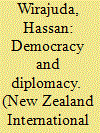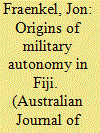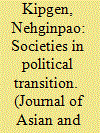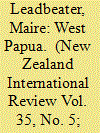|
|
|
Sort Order |
|
|
|
Items / Page
|
|
|
|
|
|
|
| Srl | Item |
| 1 |
ID:
076400


|
|
|
|
|
| Publication |
2007.
|
| Summary/Abstract |
Throughout periods of political instability and economic adversity - from Dutch colonial rule, through President Suharto's period in office, to more recent times - ethnic Chinese in Indonesia have been recurrent scapegoats for violence. Suharto, especially, manipulated local perceptions of the Chinese in the economic and political arenas, to suit the needs of his government. Yet, circumstances have changed since the 1998 riots in Indonesia and Suharto's departure. Subsequent presidents have introduced legislation aimed at reducing legal restrictions on Chinese Indonesians and they, in turn, are beginning to have greater public voice through a diversity of outlets. These include the growth of numerous new print and television media; a flourishing literature sphere; the rise of a variety of political parties, both ethnicity-based and more wide-ranging; and the development of non-political organisations, some tackling discrimination and others focusing upon Chinese sociocultural needs. These channels are facilitating the appearance of new and re-emerging ethnic Chinese identities, some surfacing from over 30 years of imposed dormancy. This paper is a preliminary investigation of manifestations of these identities among ethnic Chinese in Indonesia's contemporary public realm.
|
|
|
|
|
|
|
|
|
|
|
|
|
|
|
|
| 2 |
ID:
113563


|
|
|
|
|
| Publication |
2012.
|
| Summary/Abstract |
Hassan Wirajuda comments on Indonesia's leadership in the promotion of democracy in ASEAN and the Asia-Pacific region.
|
|
|
|
|
|
|
|
|
|
|
|
|
|
|
|
| 3 |
ID:
094000


|
|
|
|
|
| Publication |
2010.
|
| Summary/Abstract |
The Asian economic crisis in 1997 helped bring down Suharto's authoritarian regime in 1998. At the same time it paved the way for more measures of economic liberalization. Some of these measures have taken the form of labor market liberalization, which aims to increase the labor market's ability to adjust to changing economic conditions by clearing what are seen as burdensome regulations, or "rigidities" as they are known in economic parlance. An important instrument in this effort is the private employment agency, which the Manpower Act no. 13/2003 introduced in 2003. This article argues that the introduction of these agencies has created opportunities for various actors in society to take advantage of the less-protected workers in the uncertain waters of the post-Suharto labor regime. In the process, the nature of industrial relations has also been changed in a way that is more predatory than liberal. Ultimately the agencies help erode the hopes for a better life for workers and undermine the revival of labor political rights in Indonesia.
|
|
|
|
|
|
|
|
|
|
|
|
|
|
|
|
| 4 |
ID:
115013


|
|
|
|
|
| Publication |
2012.
|
| Summary/Abstract |
This paper argues that Malaysia-Indonesia relations have become increasingly problematic and complex to manage in a post-Mahathir/Suharto era. The unequal pace of the democratization pattern in both countries has largely contributed to this state of affairs. The four key 'transnational' variables or determinants such as migrant labor, mass media, non-governmental organizations and the Anwar factor have significantly impacted on Malaysia's ties with Indonesia against the backdrop of the unequal domestic political changes. These four variables have over the years become more prominent in bilateral relations - often in negative terms. More specifically, they represent the dynamics of the people-to-people dimension in bilateral ties. As such, the deterioration in people-to-people relations threatens to significantly reshape government-to-government diplomacy. Bilateral relations could yet face their severest contradictions when official diplomacy is incapable of reflecting accurately popular sentiments. In effect, the roles of state and non-state actors have been instrumental in influencing recent developments of Malaysia-Indonesia relations.
|
|
|
|
|
|
|
|
|
|
|
|
|
|
|
|
| 5 |
ID:
121667


|
|
|
|
|
| Publication |
2013.
|
| Summary/Abstract |
Alongside Thailand and Pakistan, Fiji has gained a reputation as the most coup-prone state in the Asia-Pacific region. Following a succession of coups, Fiji's military eventually established a longer-term authoritarian administration, inviting comparisons with Burma and Indonesia under Suharto, where military rulers also saw themselves as playing an overarching guardian role transcending ethnic cleavages. Yet, unlike Burma and Indonesia, Fiji's military has no heroic history of involvement in a national liberation struggle and faces no serious threat to territorial integrity. This article examines the dynamics of Fiji's three coups and the accompanying shifts in military orientation. During the initial coups, the military served principally as an instrument of the country's ethnic Fijian chiefly elite. Since the third coup, in December 2006, it has not only confronted key institutions of Fijian power, including the Great Council of Chiefs and the Methodist Church, but also dismantled core bases of Fiji Indian politics, including sugar cane farmers' organisations and municipal councils. International focus on the electoral timetable has distracted attention from these deeper-seated changes. Fiji has reached the end of a long era of bicommunal ethnic politics, with schisms amongst indigenous Fijian factions likely to dominate the country's politics in the future.
|
|
|
|
|
|
|
|
|
|
|
|
|
|
|
|
| 6 |
ID:
099449


|
|
|
|
|
| Publication |
2010.
|
| Summary/Abstract |
What explains the recent internal territorial changes in the Indonesian archipelago? Given the relatively constant number of provinces and districts during the New Order period, the sudden rise of new districts and provinces in post-authoritarian Indonesia is puzzling. This article argues that the phenomenon is driven by multilevel alliances across different territorial administrative levels, or territorial coalitions. It suggests that national level institutional changes explain the timing of provincial proliferation and that the triggers can vary, depending on historical and cultural contexts.
|
|
|
|
|
|
|
|
|
|
|
|
|
|
|
|
| 7 |
ID:
115721


|
|
|
|
|
| Publication |
2012.
|
| Summary/Abstract |
This article explores the different patterns of political transitions under two military dictatorships in Southeast Asia. Burma and Indonesia were former colonies which gained independence from the British and the Netherlands in 1948 and 1945 respectively. General Ne Win ruled Burma for over two decades (1962-88) and General Suharto ruled Indonesia for over three decades (1967-98). The article examines why Burma remained a military dictatorship after the downfall of the Ne Win-led Burma Socialist Program Party (BSPP) government, while Indonesia transitioned to a democratic society with the collapse of the Suharto-led New Order government. The article argues that a lack of a unified and established civilian leadership, coupled with the army's reluctance to relinquish power, led to another military coup in Burma, whereas the military in Indonesia encouraged the emergence of a civilian government by establishing and strengthening bureaucracies.
|
|
|
|
|
|
|
|
|
|
|
|
|
|
|
|
| 8 |
ID:
098235


|
|
|
|
|
|
|
|